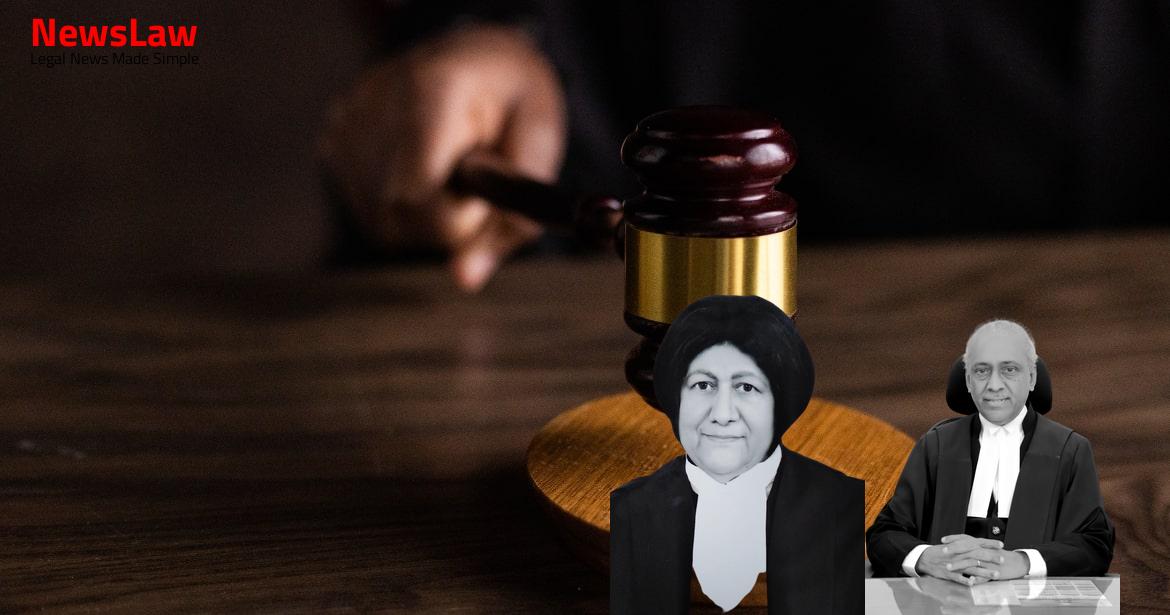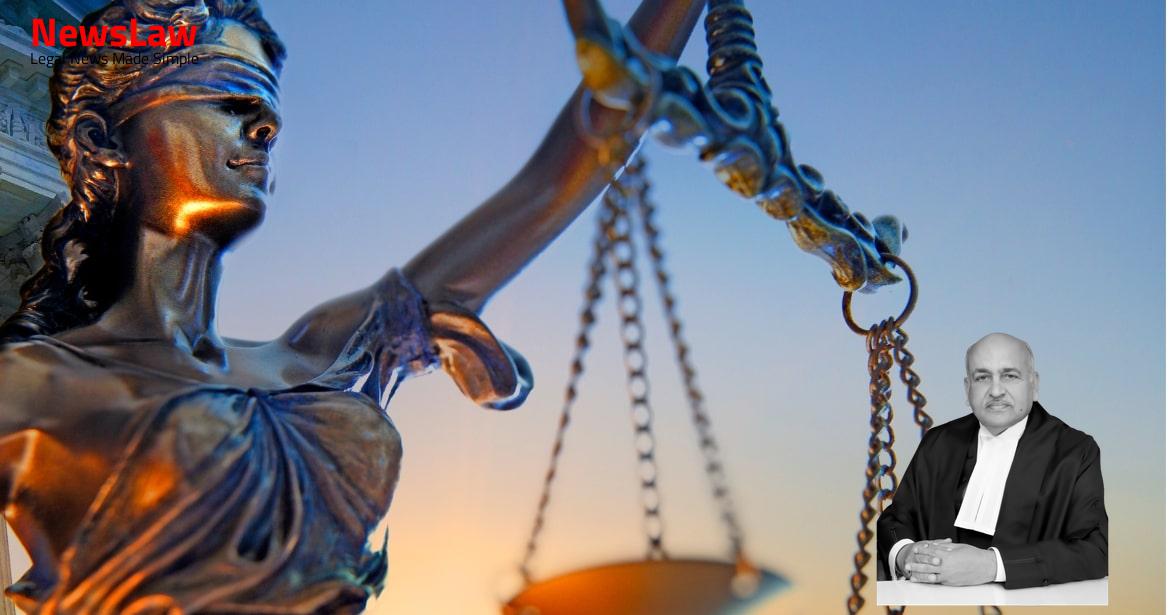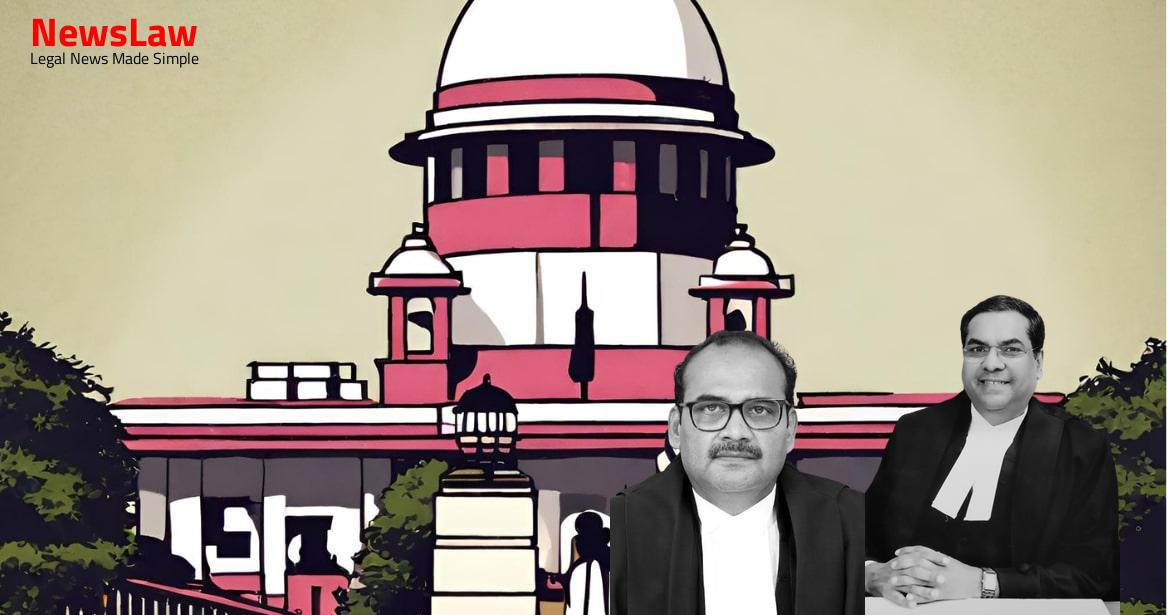The High Court delved into a detailed legal analysis regarding the setting aside of an ex-parte decree involving a minor. Discover the court’s examination of procedural requirements and the concept of prejudice to minors in such cases. The court’s jurisdiction under Article 227 and the stringent rules governing the appointment of guardians for minor defendants were pivotal in the analysis. Let’s delve deeper into the complexities of legal procedures and considerations in cases involving minors.
Facts
- The High Court found the ex-parte decree to be a nullity as it was passed against a minor without proper representation.
- Exercising power under Article 227 of the Constitution, the High Court set aside the ex-parte decree on condition of payment of Rs.2,50,000 as costs.
- The petitioners were required to pay the amount representing expenses incurred by the decree holders in stamp paper and executing the sale deed.
- The trial court dismissed the application to set aside the ex-parte decree primarily due to delay, lack of timely filing of the written statement, and previous allowance of execution and sale deed.
- Aggrieved by the dismissal, the respondents filed a revision petition under Section 115 of the Code before the High Court.
- The High Court found that proper procedure for appointing a guardian for the minor was not followed, invoked Article 227, and set aside the ex-parte decree without considering the delay condonation aspect.
- Respondents filed application for condonation of delay in setting aside ex-parte decree after 862 days.
- Respondents deposited cost of Rs.2,50,000 on 12.10.2020.
- Petitioners filed Execution Petition EP No.33 of 2015 which was eventually numbered as EA No.40 of 2017.
- Notices served on respondents in the Execution Petition in December 2015 and 2016.
- Respondents set ex-parte in Execution Petition on 18.10.2016 and the petition was allowed.
- Trial Court took up the suit for trial after framing issues.
- Doubt about appointment of a guardian for the third defendant led to original records being summoned by the judge.
- Sale deed executed by the Court on 04.01.2017.
- Trial Court decreed the suit ex-parte on 08.04.2015.
- Alternate relief sought by petitioners for refund of money paid with interest at 18% per annum.
- Trial Court granted primary relief of specific performance without reasons.
- Petitioners filed application in I.A No.981 of 2013 for appointing the second respondent as the guardian of the minor.
- Order passed by Trial Court on 23.03.2014 regarding the appointment of guardian.
Also Read: Challenging Conviction: Legal Analysis Spotlight
Arguments
- The respondents’ counsel argued that the High Court had the authority to set aside an ex-parte decree in a revision petition arising from a Section 5 Limitation Act application.
- It was contended that the Court could invoke equity in favor of the respondents despite their negligence in defending the suit and execution proceedings.
- The petitioners’ counsel argued that the High Court should not have considered equity in this case as the respondents were negligent in various aspects.
- The lack of following prescribed procedures or causing grave prejudice to the defendant/minor was not a ground raised by the respondents in their revision petition.
- The respondents’ counsel emphasized that the High Court’s revisional jurisdiction under Article 227 allows for broader considerations, especially when the interest of a minor involved in the proceedings is not adequately protected by the trial Court following legal procedures.
- The decision of the Travancore Cochin High Court in Ouseph Joseph vs Thoma Eathamma, relied upon by the petitioners, supports the correctness of the impugned order.
- The cited case does not favor the petitioners’ argument.
- The judgment from a Division Bench of the Madras High Court in Lanka Sanyasi vs Lanka Yerran Naidu is not relevant to the petitioners’ case.
Also Read: Analysis of Contempt Charges for Breach of Undertaking
Analysis
- The High Court found that the trial Court failed to appoint a guardian for the minor as prescribed by law.
- The decree could have been set aside only as against the minor respondent, not all the others.
- The concept of prejudice to the minor was introduced through Rule 3-A in Order XXXII.
- The appointment of a guardian for the minor may be obtained upon application by the Plaintiff.
- The High Court’s power to examine records in a revision under Section 115(1) of the Code was not questioned.
- The High Court’s invocation of Article 227 to set aside the ex-parte decree was justified.
- Rule 3-A in Order XXXII was introduced in 1976 to address conflicting opinions regarding decrees involving minors and guardians.
- The High Court’s jurisdiction to look into records concerning persons under disability was upheld.
- The rigorous nature of the Madras amendment to Rule 3 of Order XXXII was attributed to the Court’s parens patriae jurisdiction.
- The High Court’s power under Article 227 is wider than under Section 115, allowing for correction of gross errors of jurisdiction.
- The Rules of Procedure in Order XXXII, Rule 3 differ between the Central Act and civil courts under the Madras High Court’s superintendence.
- The Rules applicable to Madras High Court courts are more detailed and stringent.
- Appointment of guardians for minor defendants in Madras High Court courts requires additional qualifications and procedures compared to the Central Act.
- The Court may appoint its officers or a pleader as a guardian if no suitable person is found.
- Specific requirements and procedures for appointing guardians for minor defendants must be followed in Madras High Court courts.
- Failure to appoint a guardian as required by the rules can lead to the court seeking clarification and corrective action.
- Processes for appointing guardians involve issuing notices, obtaining consent, and handling funds for the minor’s defense.
- The High Courts have the power to alter or add to the Rules in the First Schedule for regulating civil court procedures under their superintendence.
- Three-member Bench overruled Surya Dev Rai on the question of jurisdiction under Article 226.
- Pointed out that jurisdiction under Article 227 is distinguishable from Article 226.
- The decision in Divya Dip Singh and others vs Ram Bachan Mishra and others addressed the issue of whether the appointment of a guardian for a minor under Order XXXII, Rule 3 would remove the right of the natural guardian.
- The decision of the Rajasthan High Court in Anandram and another vs Madholal and others focused on the potential prejudice to the minor, particularly when the father filed a written statement on behalf of the minors and admitted part consideration.
- In Rangammal vs. Minor Appasami, it was found that the minor’s interests were adequately protected in the suit.
- The High Court in Lanka Sanyasi held that a minor defendant attaining majority during a suit, but not electing to continue the defense himself and have the guardian ad litem discharged, does not invalidate the judgment passed in the suit.
- The question in Lanka Sanyasi was whether a person who became a major at the time a compromise decree was issued in a suit could challenge the decree in a subsequent suit.
- The High Court order was found to be legal and not warranting interference under Article 136.
Also Read: Land Dispute: Court’s Analysis on Condonation of Delay
Decision
- Special Leave Petition dismissed by the court.
Case Title: K.P. NATARANJAN Vs. MUTHALAMMAL (2021 INSC 337)
Case Number: SLP(C) No.-002492 / 2021



